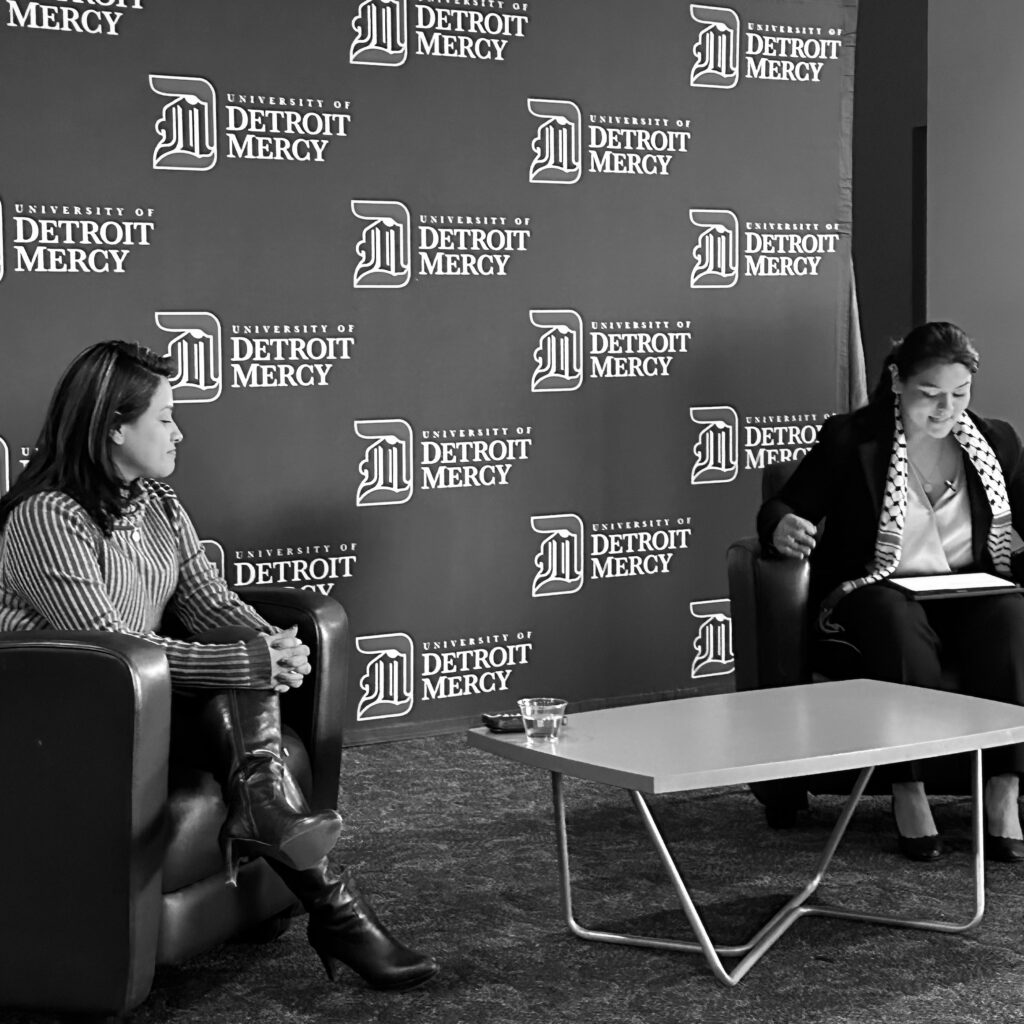
Detroit City Council Member and University of Detroit Mercy alumna, Gabriela Sanitago-Romero ’15, visited the McNichols campus on Feb. 19, to speak with individuals in a conversational interview.
Santiago-Romero made history as the first out LGBTQ councilmember elected to Detroit City Council.
During her visit, she linked her political journey to her immigrant background, navigating through layered intersectional identities, and reflecting on her experience growing up in Southwest Detroit.
As a Mexican immigrant raised in Southwest Detroit, Santiago-Romero directly understood the importance of electing individuals in positions of power that prioritize the well-being of others.
Although she always had food, electricity, and heat, she later realized that her family relied on various systems, infrastructure, local nonprofits, and ultimately elected officials, to survive.
“I saw first-hand what it means to have people in positions of power that really care about others, because it directly impacted my life,” Santiago-Romero said.
Initially, Santiago-Romero grew up protesting politicians. At an early age, she learned about the underlying effects of ideologies like racism and capitalism. She believed that political roles were unattainable for women of color.
It was not until she met former Mich. Rep. and current Congresswoman Rashida Tlaib that her opinion on politicians changed.
While studying international business at Detroit Mercy, Santiago-Romero had called Tlaib to report an explosion in Southwest Detroit. Although she was hesitant at first, she was surprised that Tlaib had returned her phone call to collect experiential data on the incident.
It was then that Santiago-Romero’s pessimistic idea of politicians shifted.
“While I was here (Detroit Mercy), I met Rashida Tlaib…who does incredible work, who taught me what it’s like to be an elected (official) who cares, who will hold corporations accountable, who will work towards supporting our workers and our community,” Santiago-Romero said.
Other influential women that inspired Santiago-Romero are former Detroit City Councilmember, Raquel Castañeda-López, and Mich. Sen., Stephanie Chang.
“So (these) three incredible women of color, all from immigrant backgrounds, all with similar struggles that just cared deeply, that were incredibly smart, that fought hard for their communities, showed me that you can be a woman of color in this space,” Santiago-Romero said.
Although Santiago-Romero had not planned to run for city council, she credits her life experiences, strong beliefs and support from caring individuals, as what led her to her current position.
She encouraged everyone to work towards something they are passionate about, whether through contributing to already existing systems, or by creating new programs or strategies in their communities.
Her presence on campus inspired students in various ways.
Santiago-Romero was interviewed by Samantha Mena, a junior studying biochemistry and political science at Detroit Mercy. She believes that Santiago-Romero’s story resonated with students due to her layered identities. After her visit, she felt affirmed in her future career path.
“Talking with Gaby [Gabriela] eased my concerns of navigating college and entering the workforce,” Mena said. “I left the event feeling inspired to continue to work on obtaining my degree and pursuing a professional career.”
As a Latina woman who aspires to enter politics, Cristal Guzmán, a political science major on the pre-law track at Detroit Mercy, similarly connected with Santiago-Romero’s story.
Guzmán’s biggest takeaway from her visit was the authentic vulnerability she displayed while sharing her experiences.
“Seeing the different aspects of her and the different identities she holds, and how proud she is of those identities, gives me hope that one day, I too, can be an advocate as she is, despite my identities and backgrounds,” Guzmán said.
Imanol Lozano, a double-major in psychology and religious studies, felt motivated by Santiago-Romero’s call to action.
“My biggest takeaway was that change is possible,” Lozano said. “We all need to be aware of the needs and injustices of our community…to paraphrase Gaby, if you plant seeds and water them, they will surely grow. I think this is a great way to think about communal work, but especially here on our campus.”
Santiago-Romero centers her work on the importance of listening to individuals’ stories. She hopes to continue serving District 6 in meaningful ways in the years that lie ahead.




